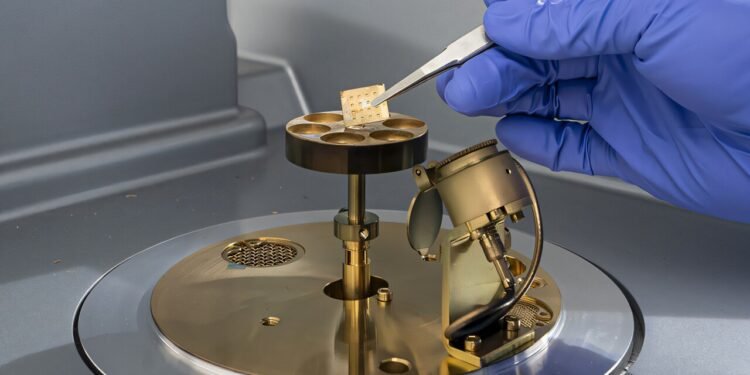
The Department of Energy’s Lawrence Berkeley National Laboratory (Berkeley Lab) and several collaborating institutions have successfully demonstrated a machine-learning technique to accelerate the discovery of materials for film capacitors—crucial components in electrification and renewable energy technologies. The technique was used to screen a library of nearly 50,000 chemical structures to identify a compound with record-breaking performance.
The other collaborators from University of Wisconsin–Madison, Scripps Research Institute, University of California, Berkeley, and University of Southern Mississippi contributed expertise in machine learning, chemical synthesis, and material characterization.
Their research was reported in the journal Nature Energy.
“For cost-effective, reliable renewable energy technologies, we need better performing capacitor materials than what are available today,” said Yi Liu, a senior scientist at Berkeley Lab who led the study. “This breakthrough screening technique will help us find these ‘needle-in-a-haystack’ materials.”
There is rapidly growing demand for film capacitors for use in high-temperature, high-power applications such as electric vehicles, electric aviation, power electronics, and aerospace. Film capacitors are also essential components in the inverters that convert solar and wind generation into the alternating-current power that can be used by the electric grid.

Film capacitors require heat-resistant materials
Batteries receive a lot of attention as a workhorse in renewable energy applications, but electrostatic film capacitors are also important. These devices consist of an insulating material sandwiched between two conductive metal sheets. While batteries use chemical reactions to store and release energy over long periods, capacitors use applied electric fields to charge and discharge energy much more quickly.
Film capacitors are used for regulating power quality in diverse types of power systems. For example, they can prevent ripple currents and smooth voltage fluctuations, ensuring stable, safe, reliable operations.
Polymers—large molecules with repeating chemical units—are well-suited for the insulating material in film capacitors because of their light weight, flexibility, and endurance under applied electric fields. However, polymers have a limited ability to tolerate the high temperatures in many power system applications. Intense heat can reduce the polymers’ insulating properties and cause them to degrade.

Narrowing down 49,700 polymers to three
Researchers have traditionally looked for high-performance polymers through trial and error, synthesizing a few candidates at a time and then characterizing their properties.
“Because of the pressing need for better capacitors, this approach is too slow to find promising molecules from the hundreds of thousands of possibilities,” said He Li, a postdoctoral researcher at Berkeley Lab.
To accelerate discovery, the research team developed and trained a set of machine-learning models known as feedforward neural networks to screen a library of nearly 50,000 polymers for an optimal combination of properties, including the ability to withstand high temperatures and strong electric fields, high energy storage density, and ease of synthesis. The models identified three particularly promising polymers.
Researchers from Scripps Research Institute synthesized the three polymers using a powerful technique, known as click chemistry, that rapidly and efficiently links together molecular building blocks into high-quality products. Scripps Professor Barry Sharpless, one of the lead researchers on the project, won a 2022 Nobel Prize in Chemistry for his research on the click-chemistry concept.
At Berkeley Lab’s Molecular Foundry, the researchers fabricated film capacitors from these polymers and then evaluated both the polymers and capacitors. The team found that they had exceptional electrical and thermal performance.
Capacitors made from one of the polymers exhibited a record-high combination of heat resistance, insulating properties, energy density, and efficiency. (A high-efficiency capacitor wastes very little energy when it charges and discharges.) Additional tests on these capacitors revealed their superior material quality, operational stability, and durability.

Making even better models
The research team is considering several lines of follow-up research.
“One idea is to design machine learning models that provide more insights into how the structure of polymers influences their performance,” said Zongliang Xie, a postdoctoral researcher at Berkeley Lab.
“Another potential research area is to develop generative AI models that can be trained to design high-performance polymers without having to screen a library,” added Tianle Yue, a graduate student at the University of Wisconsin–Madison.
“Our AI analysis quickly identified some key variables in the polymer design details that were predicted to add big improvements in the shielding properties of these polysulfate membranes. As reported in our new Nature Energy study, these earliest machine learning predictors for improving the capacitors are dramatically born-out by experiment,” said Sharpless, W.M. Keck Professor of Chemistry at Scripps Research.
More information:
Li, H., et al. Machine learning-accelerated discovery of heat-resistant polysulfates for electrostatic energy storage. Nature Energy (2024). DOI: 10.1038/s41560-024-01670-z
Lawrence Berkeley National Laboratory
Citation:
Machine-learning models help discover a material for film capacitors with record-breaking performance (2024, December 5)
retrieved 5 December 2024
from https://techxplore.com/news/2024-12-machine-material-capacitors.html
This document is subject to copyright. Apart from any fair dealing for the purpose of private study or research, no
part may be reproduced without the written permission. The content is provided for information purposes only.










